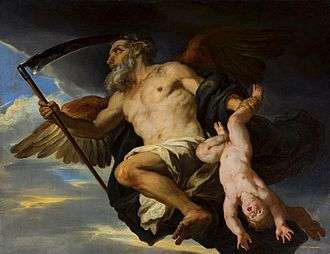Chronos
Chronos (/ˈkroʊnɒs/; Greek: Χρόνος, [kʰrónos] IPA: /ˈχrɔːnɒˌs/; Meaning - "time"), also spelled Khronos or Chronus, is the personification of time in pre-Socratic philosophy and later literature.[1]
| Chronos | |
|---|---|
_-_Time_Clipping_Cupid's_Wings_(1694).jpg) Time Clipping Cupid's Wings (1694), by Pierre Mignard | |
| Other names | Aion |
| Symbol | Harvesting Scythe, Zodiac Wheel |
| Parents | None, Self created |
| Consort | Ananke |
| Offspring | |
Chronos already was confused with, or perhaps consciously identified with, the Titan Cronus in antiquity due to the similarity in names.[2] The identification became more widespread during the Renaissance, giving rise to the allegory of "Father Time" wielding the harvesting scythe.[3]
He was depicted in Greco-Roman mosaics as a man turning the Zodiac Wheel.[4] Chronos might also be contrasted with the deity Aion as cyclical Time[5] (see aeon). Chronos is usually portrayed as an old, wise man with a long, grey beard, similar to Father Time. In some Greek sources, Kairos is mentioned as a brother of Chronos. However, other sources point out that it is his son.
Name and etymology

During antiquity, Chronos was occasionally interpreted as Cronus.[6] According to Plutarch, the Greeks believed that Cronus was an allegorical name for Chronos.[7] In addition to the name, the story of Cronus eating his children was also interpreted as an allegory to a specific aspect of time held within Cronus' sphere of influence. According to this theory, Cronus represented the destructive ravages of time which consumed all things, a concept that was expressed literally when the Titan king devoured the Olympian gods — the past consuming the future, the older generation suppressing the next generation. During the Renaissance, the identification of Cronus and Chronos gave rise to "Father Time" wielding the harvesting scythe.
The original meaning and etymology of the word chronos are uncertain.[8] English words derived from it include chronology, chronometer, chronic, anachronism, synchrony, and chronicle.
Mythology
In the Orphic tradition, the unaging Chronos was "engendered" by "earth and water", and produced Aether and Chaos, and an egg.[9] The egg produced the hermaphroditic god Phanes who gave birth to the first generation of gods and is the ultimate creator of the cosmos.
Pherecydes of Syros in his lost Heptamychos ("the seven recesses"), around 6th century BC, claimed that there were three eternal principles: Chronos, Zas (Zeus) and Chthonie (the chthonic). The semen of Chronos was placed in the recesses of the Earth and produced the first generation of gods.[10]
Notes
- "(Dictionary Entry)". Henry George Liddell, Robert Scott, A Greek-English Lexicon. Retrieved 2015-07-13.
- LSJ s.v. Κρόνος.
- Macey, Samuel L. (2013-04-11). Encyclopedia of Time. Routledge. p. 209. ISBN 9781136508905.
- Delaere, Mark (2009). Unfolding Time: Studies in Temporality in Twentieth-century Music. Leuven University Press. ISBN 9789058677358.
- Doro Levi, "Aion," Hesperia 13.4 (1944), p. 274.
- LSJ s.v. Κρόνος.
- Plutarch, On Isis and Osiris, 32.
- Beekes, R. S. P.. (2009). Etymological Dictionary of Greek, pp. 1651–1652. Brill.
- West, p. 178.
- Kirk, Raven, and Schofield, pp. 24, 56.
References
- Kirk, G. S., J. E. Raven, M. Schofield. The Presocratic Philosophers: A Critical History with a Selection of Texts. Cambridge University Press; 2 edition (February 24, 1984). ISBN 0521274559.
- Plutarch, Moralia, Volume V: Isis and Osiris. The E at Delphi. The Oracles at Delphi No Longer Given in Verse. The Obsolescence of Oracles. Translated by Frank Cole Babbitt. Loeb Classical Library No. 306. Cambridge, MA: Harvard University Press, 1936. ISBN 978-0-674-99337-2. Online version at Harvard University Press.
- West, M. L. (1983), The Orphic Poems, Clarendon Press. ISBN 978-0-19-814854-8.